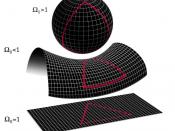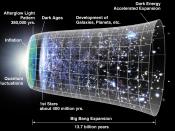One of the arguments used by many people over the centuries is called the cosmological argument, which was based on the universe, hence the name "cosmos". This argument claimed that God exists because the universe had to be constructed from some point, and it wouldn't exist by itself.
They explain that something (the universe) could not possibly have come from nothing (before the big bang or the start of the universe). Every effect has a cause. The whole of life is a chain of cause and effect. Using this logic, the universe must have been caused by something dramatic occurring before the universe existed. There must have been a cause, or a reason, for how and why everything began - an original cause.
Thinking about this provokes more questions. As in the game of dominos, as each domino falls, more and more dominos will fall. This is called the domino effect.
So basically, something must have had to start this entire process. This something must be eternal (without beginning or end) or otherwise something would have to been there to create that being. If we apply this logic to the readily believed Big Bang, then we strive to find out what caused the Big Bang. Could it have been god?
However some philosophers now argue that the universe itself could be eternal so it wouldn't require any external influence to bring it into existence. It basically exists in a "steady state" of growth and development. Karl Marx, the founder of communism, held a similar idea. He firmly believed that the only reality is matter. Matter is infinite and simply reproduces itself in the cause of evolution. In chemical equations, the some elements go in, but although they may change, the same basic elements remain after the experiment.


